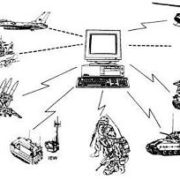 I don’t know about you, but I am sick of certain clichés about unmanned systems and combat. It’s just my opinion, but some commonly repeated statements confuse, rather than clarify. Here are a couple of my “favorites.”
I don’t know about you, but I am sick of certain clichés about unmanned systems and combat. It’s just my opinion, but some commonly repeated statements confuse, rather than clarify. Here are a couple of my “favorites.”
“The use of unmanned systems in combat will destroy the warrior ethos.”
I’m sure you’ve heard this. “They’re cowards, these so-called ‘soldiers’ who strike from afar. A real man confronts his enemy face-to-face. These new weapons should be banned.”
Of course, this quote is from a French nobleman talking the English archers and their long bows. The whole argument about the unmanliness of “death from afar” probably started the first time someone threw a rock. This line of reasoning ignores the fact that war isn’t about building soldierly virtues; it’s about winning (or to paraphrase Patton, “Making the other guy die for his country”).
Besides as Fred Kaplan points out in Wonder Weapons Don’t Win Wars on Slate.com “Far from fulfilling the dream of wars waged far above the crude skirmish of terrestrial battle, the age of the drones has brought back the days when the chief mission of the Air Force was to support troops on the ground.”
In other words, don’t throw out those boots yet; they’re still needed on the ground.
“The use of unmanned systems makes killing easier. Remote controlled war means we don’t see the death of our enemies.”
Unmanned systems make us more likely to see the dead. Military.com reports in Predator Pilots Suffering War Stress, that unmanned aircraft’s cameras enable their operators “… to see people getting killed in high-resolution detail.” This is in complete contrast to bomber pilots who rarely see the results of their missions. According to this report, this his has contributed to UAV operators “suffering some of the same psychological stresses as their comrades on the battlefield.”
UAV video can be used as so-called war porn, which is seen as dangerously dehumanizing. But like the argument against “death from afar,” this is nothing new. Dehumanizing adversaries is as old as war itself.
Besides, very few unmanned systems are used lethally. Hunter-killer Predators may get the publicity, but they are far outnumbered by humble UGVs that save lives through IED detection and surveillance.
“We shouldn’t use unmanned systems in combat because they could make mistakes and kill the wrong people.”
A recent report by the Army (see Drone operators at fault in Afghan deaths) would seem to support this commonly heard comment. However, carefully read the headline. People caused the problem, not the robots. As long as human beings fight wars, human error will be a reality.
Like the other criticisms against unmanned systems in combat, this actually refers to a phenomena found in traditional warfare as well. I wonder if this same argument against new technology was made in 1461, when during the War of the Roses, arrows accidently fell amongst friendly troops.
“Unmanned systems are inappropriate for counter-insurgency.”
Actually, there should be more discussion about this. True, most missions performed by unmanned systems, such as recognizance and intelligence, are totally appropriate for counter insurgency. However, what about the few unmanned systems that are actually lethal?
By its nature, counter-insurgency implies engagement with the local population. Remote-controlled strikes may take out the bad guys, but they reinforce the enemy’s narrative that we are a distant occupying power. It does us no good to “cut off the head”, when we lose the hearts and minds.
What about you, dear reader? Do you have any “favorite” clichés that you are sick of?








A good cliches is “Unmanned vehicle systems save human lives.”
With the average age of people being killed or permantently injured being in the range of maximum child bearing, saving these lives makes alot of other people very happy as well.